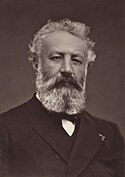Jules Verne Quote
London time, and on regarding that of the countries he had passed through as quite false and unreliable. Now, on this day, though he had not changed the hands, he found that his watch exactly agreed with the ship's chronometers. His triumph was hilarious. He would have liked to know what Fix would say if he were aboard! The rogue told me a lot of stories, repeated Passepartout, about the meridians, the sun, and the moon! Moon, indeed! moonshine more likely! If one listened to that sort of people, a pretty sort of time one would keep! I was sure that the sun would some day regulate itself by my watch! Passepartout was ignorant that, if the face of his watch had been divided into twenty-four hours, like the Italian clocks, he would have no reason for exultation; for the hands of his watch would then, instead of as now indicating nine o'clock in the morning, indicate nine o'clock in the evening, that is, the twenty-first hour after midnight precisely the difference between London time and that of the one hundred and eightieth meridian. But if Fix had been able to explain this purely physical effect, Passepartout would not have admitted, even if he had comprehended it. Moreover, if the detective had been on board at that moment, Passepartout would have joined issue with him on a quite different subject, and in an entirely different manner.
London time, and on regarding that of the countries he had passed through as quite false and unreliable. Now, on this day, though he had not changed the hands, he found that his watch exactly agreed with the ship's chronometers. His triumph was hilarious. He would have liked to know what Fix would say if he were aboard! The rogue told me a lot of stories, repeated Passepartout, about the meridians, the sun, and the moon! Moon, indeed! moonshine more likely! If one listened to that sort of people, a pretty sort of time one would keep! I was sure that the sun would some day regulate itself by my watch! Passepartout was ignorant that, if the face of his watch had been divided into twenty-four hours, like the Italian clocks, he would have no reason for exultation; for the hands of his watch would then, instead of as now indicating nine o'clock in the morning, indicate nine o'clock in the evening, that is, the twenty-first hour after midnight precisely the difference between London time and that of the one hundred and eightieth meridian. But if Fix had been able to explain this purely physical effect, Passepartout would not have admitted, even if he had comprehended it. Moreover, if the detective had been on board at that moment, Passepartout would have joined issue with him on a quite different subject, and in an entirely different manner.
Related Quotes
About Jules Verne
In addition to his novels, he wrote numerous plays, short stories, autobiographical accounts, poetry, songs, and scientific, artistic, and literary studies. His work has been adapted for film and television since the beginning of cinema, as well as for comic books, theater, opera, music and video games.
Verne is considered to be an important author in France and most of Europe, where he has had a wide influence on the literary avant-garde and on surrealism. His reputation was markedly different in the Anglosphere where he had often been labeled a writer of genre fiction or children's books, largely because of the highly abridged and altered translations in which his novels have often been printed. Since the 1980s, his literary reputation has improved.
Jules Verne has been the second most-translated author in the world since 1979, ranking below Agatha Christie and above William Shakespeare. He has sometimes been called the "father of science fiction", a title that has also been given to H. G. Wells and Hugo Gernsback. In the 2010s, he was the most translated French author in the world. In France, 2005 was declared "Jules Verne Year" on the occasion of the centenary of the writer's death.
